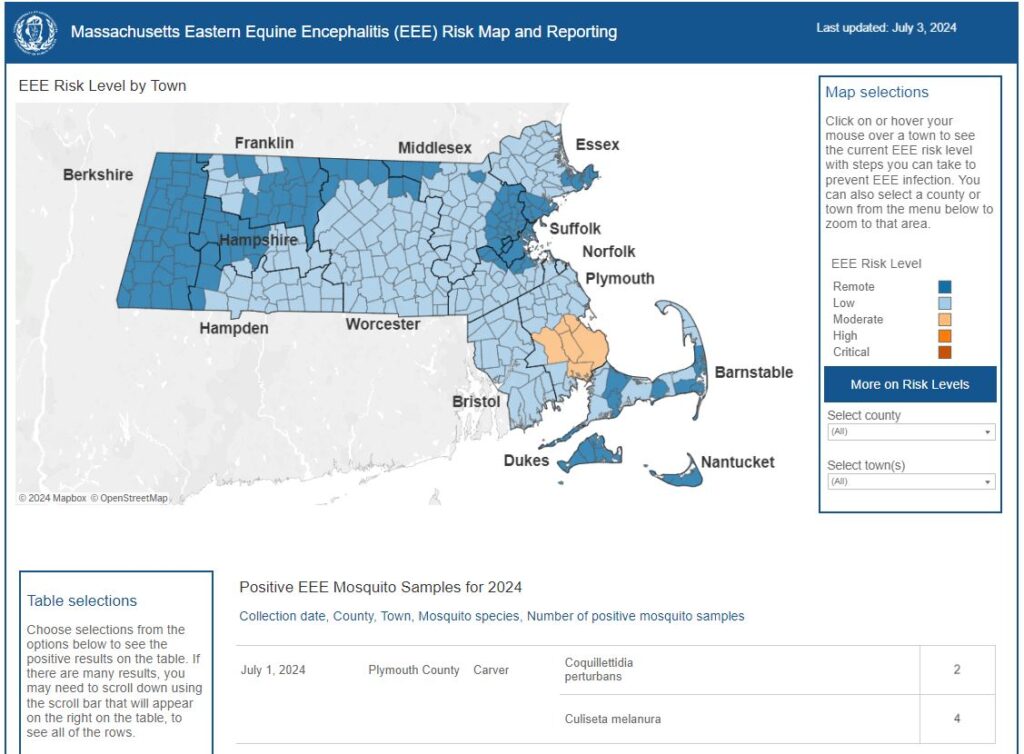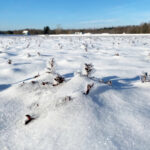In the first instance of the mosquito-borne virus in Massachusetts this year, EEE has been detected in Carver, according to the Massachusetts Department of Public Health.
The presence of Eastern equine encephalitis was confirmed from mosquito samples collected on June 30. According to the department, no human or animal cases of the virus have been detected so far this year.
According to the public health department, EEE is a serious and potentially fatal disease that can affect people of all ages, which is generally spread through the bite of an infected mosquito. According to the Carver Board of Health, EEE has about a 50% mortality rate with often survivors suffering from long-term effects.
The virus is rare. The last human cases of EEE in Massachusetts occurred in 2020, with five cases and one death. Since then, no human cases have been reported in the state.
“EEE activity in Massachusetts tends to occur in outbreak cycles,” State Epidemiologist Dr. Catherine M. Brown said. “When EEE is found in mosquitoes like this at the start of the season, the risk may increase throughout the rest of the summer.”
Including Carver, EEE risk level has been increased to “moderate” in nearby towns, like Kingston, Middleboro, Plymouth, Plympton and Wareham.
According to Public Health Commissioner Robbie Goldstein, the department of public health is asking everyone to take necessary precautions to prevent mosquito bites.
“We recommend that people use mosquito repellent when they are spending time outdoors so they can celebrate the July 4th holiday and enjoy the rest of the summer without being bitten,” Goldstein said.
In Carver, this might mean taking extra precautions during the upcoming holiday, with a multitude of protective measures recommended by both state and town health officials.
“Usually, I recommend that people limit activity from sun down to sun up,” a representative of the Carver Board of Health wrote in a Facebook post. “But, it’s 4th of July weekend. I hope that people will still try to limit activity, but realize that this is not a realistic expectation.”
If people do decide to go outside, the Carver Board of Health recommends wearing light-colored clothing, since mosquitoes are attracted to darker colors. In red, white and blue, mosquitoes will be most attracted to the red parts of an outfit, according to the board.
The board also recommended against citronella candles and bug zappers, which, according to the Carver Board of Health, do not work. Instead the board recomends an EPA-registered porch repellent or a fan.
The Department of Public Health recommended that everyone apply bug spray when outdoors and to wear mosquito-protective clothing like long sleeved shirts, pants and socks.
The Carver Board of Health suggested residents not to rely on commercial mosquito spray applicators.
“Mosquito sprays can vary wildly between companies and applications,” a representative from the board wrote. “If you choose to have a spray conducted, consider it supplemental to other measures.”
According to the public health department, mosquitoes are most active from dusk to dawn, which are peak biting times.
More information about EEE can be found on the state’s risk map.

Contact the Carver Journal at stories@carverjournal.com


